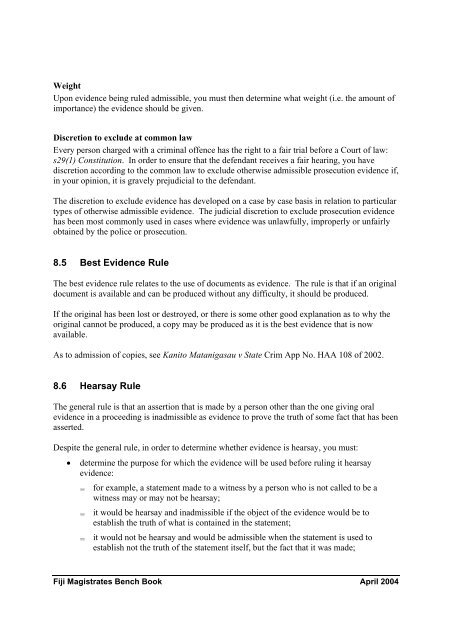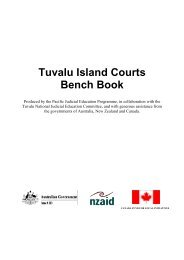Fiji Magistrates Bench Book - Federal Court of Australia
Fiji Magistrates Bench Book - Federal Court of Australia
Fiji Magistrates Bench Book - Federal Court of Australia
You also want an ePaper? Increase the reach of your titles
YUMPU automatically turns print PDFs into web optimized ePapers that Google loves.
Weight<br />
Upon evidence being ruled admissible, you must then determine what weight (i.e. the amount <strong>of</strong><br />
importance) the evidence should be given.<br />
Discretion to exclude at common law<br />
Every person charged with a criminal <strong>of</strong>fence has the right to a fair trial before a <strong>Court</strong> <strong>of</strong> law:<br />
s29(1) Constitution. In order to ensure that the defendant receives a fair hearing, you have<br />
discretion according to the common law to exclude otherwise admissible prosecution evidence if,<br />
in your opinion, it is gravely prejudicial to the defendant.<br />
The discretion to exclude evidence has developed on a case by case basis in relation to particular<br />
types <strong>of</strong> otherwise admissible evidence. The judicial discretion to exclude prosecution evidence<br />
has been most commonly used in cases where evidence was unlawfully, improperly or unfairly<br />
obtained by the police or prosecution.<br />
8.5 Best Evidence Rule<br />
The best evidence rule relates to the use <strong>of</strong> documents as evidence. The rule is that if an original<br />
document is available and can be produced without any difficulty, it should be produced.<br />
If the original has been lost or destroyed, or there is some other good explanation as to why the<br />
original cannot be produced, a copy may be produced as it is the best evidence that is now<br />
available.<br />
As to admission <strong>of</strong> copies, see Kanito Matanigasau v State Crim App No. HAA 108 <strong>of</strong> 2002.<br />
8.6 Hearsay Rule<br />
The general rule is that an assertion that is made by a person other than the one giving oral<br />
evidence in a proceeding is inadmissible as evidence to prove the truth <strong>of</strong> some fact that has been<br />
asserted.<br />
Despite the general rule, in order to determine whether evidence is hearsay, you must:<br />
• determine the purpose for which the evidence will be used before ruling it hearsay<br />
evidence:<br />
<br />
<br />
<br />
for example, a statement made to a witness by a person who is not called to be a<br />
witness may or may not be hearsay;<br />
it would be hearsay and inadmissible if the object <strong>of</strong> the evidence would be to<br />
establish the truth <strong>of</strong> what is contained in the statement;<br />
it would not be hearsay and would be admissible when the statement is used to<br />
establish not the truth <strong>of</strong> the statement itself, but the fact that it was made;<br />
<strong>Fiji</strong> <strong>Magistrates</strong> <strong>Bench</strong> <strong>Book</strong> April 2004
















